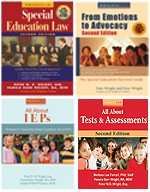What's In Store at Wrightslaw?
![]()
Special Ed Law & Advocacy Training (6.5 hrs)
25% Off the Wrightslaw Bundle of 4 PRINT books for $58.35 (Sorry, coupons not accepted on this product)
Includes Wrightslaw: Special Education Law, 2nd Ed., Wrightslaw: From Emotions to Advocacy, 2nd Ed., Wrightslaw: All About IEPs and Wrightslaw: All About Tests and Assessments, 2nd Ed.
New! The Wrightslaw Bundle is now available as an immediate PDF download. All four Wrightslaw books as PDFs for just $49.95!
![]()
Success Story:
Cold Hard Numbers and a Successful IEP Meeting
My
son Sam has autism. He just turned three. For the past 10 months,
he received ABA therapy and made good progress.
We
recently moved to a new town. Our new school district was not familiar
with ABA therapy and was skeptical about our ABA program.
I had to persuade them to continue Sam's ABA therapy program.
Objective Test Results
During the IEP process, the district did several evaluations on
Sam to get baseline data. Many of these evaluations were the same
scales that were used more than a year ago when he went through
intake for early intervention (0 to 3 years) program.
When the district compared Sam's scores on evaluations done over
a year ago to his scores on their current evaluations, they saw
he made tremendous gains with ABA therapy.
My little guy's scores KNOCKED THEIR SOCKS OFF!!!
Subjective Therapy Notes
I also gave the district copies of all therapist's notes (OT and
SLP), including notes from before we began the ABA program. These
early notes looked pretty good: "Sam had a good day."
"Sam had better eye-contact."
But when you looked at his objective test scores during this period,
you saw that these subjective notes were a joke. The objective test
scores showed that his IFSP goals were not being met. In fact, most
goals were being achieved less than 25% of the time.
When the district reviewed objective data from early and current
evaluations, it was clear that Sam made no progress in the traditional
early intervention program and tremendous gains after we began ABA
therapy.
Cold Hard Numbers & a Successful IEP
Meeting
I thought I would have to do a lot of persuasive arguing on behalf
of ABA at the IEP meeting.
I DIDN'T HAVE TO SAY A WORD!
The IEP team had reviewed the objective data before the meeting.
They gave us everything we needed for Sam - 30 hours of home-based
ABA therapy and a preschool class one morning a week. The team even
asked how much speech therapy we wanted for him! I was stunned.
Then I realized a certain truth . . . you cannot argue against cold
hard numbers. We had enough hard data to convince them that the
traditional educational program for young children with autism did
not work (at least for Sam) and that ABA was necessary for Sam to
receive FAPE.
My Advice to Parents
Get your child evaluated independently by an expert in the
private sector as soon as possible.
Get a comprehensive evaluation of your child by an individual who
has expertise in your child's disability and educational needs.
Your evaluator should be independent of the school district - not
a district employee. Your evaluator should be willing to attend
an IEP meeting and explain the reasons for making specific recommendations
and what will happen to the child if the school ignores these recommendations.
(Remember - parents and evaluators can never use the words "best"
or "maximize the child's potential")
If you have a young child with autism, the evaluator should use
developmental scales such as the DENVER 2, Vineland, CARS, DIAL-3,
etc. These evaluations will give you objective data that shows the
school where your child was at the beginning (when you began the
program) and where the child is functioning now.
The ABLLS is important, but the other scales are important too,
especially if they are used by your school district as evaluation
tools.
Be sure the school has all available information on your child.
If you make sure that the school has all important information about
your child, you make it more likely that they will make good decisions
on your child's behalf. (Our district did not have any of Sam's
therapy notes from one agency.)
Build a healthy
working relationship with the school.
Keep an open mind. Listen to suggestions from school personnel.
Be an active member of the team. Be considerate of school personnel
and their profession.
But do not back down from what your child needs. While there is
room for compromise, key elements of your child's educational program
are not negotiable.
Everything
I know about the IEP process I learned on your site or from your
books. Our success in our IEP meeting was possible because I came
prepared. And I came prepared because I read your "game plans"
and your books.
Jana
(Sam's Mom)
To Top
More Resources . .
.
Wrightslaw Books
Wrightslaw:
Special Education Law, 2nd Edition
Wrightslaw:
From Emotions to Advocacy, 2nd Edition - The Special Education Survival Guide
Wrightslaw Game Plans
Game Plan: IEP Goals and Objectives
Game Plan: Resolve Eligibility Disputes
Wrightslaw
Topics Pages
Autism
Free Appropriate
Education (FAPE)
IEP
Articles
How to Write Measurable Annual Goals. Memorandum from Nissan Bar-Lev, special ed director, that describes the process of writing clear, measurable IEP goals.
How to Make Annual Goals Measurable: Examples and Tips. Remember that "measurable" means you can count it or observe it. Article uses common goals, shows why they aren't clear or measurable, and how to make them clear and measurable.
What is Your IEP IQ? Take this quiz to test your knowledge of IEPs. We will send you the answers by email.
Your
Child's IEP: Practical and Legal Guidance for Parents, Advocates
and Attorneys. This comprehensive article describes the
parental role in the IEP process; what should be included in your
child's IEP; what the law and regulations say about IEPs, and how
you can use this information to get better services for your child.
Play
Hearts, Not Poker. In this article, Jennifer Bollero (attorney
and mother of a child with autism), describes important differences
between advocacy and parenting and explains why you need to learn
the rules and strategies - when you learn the rules, you reduce
the risks when you negotiate for your child; article includes "Eight
Steps to Better IEP Meetings.
To Top
IEP Checklists
Present Levels of Performance Checklist. Key question; purpose; definition; key characteristics; writing strategy.
Annual Goals Checklist. Key question; purpose; definition; key characteristics; writing strategy
Short Term Objectives and Benchmarks Checklist. Key question; purpose; key characteristics; writing strategy.
IEP Review Checklist. If you are preparing for an IEP meeting, review this checklist.
The
Parent as Expert: More Resources on Fetaweb.com
For more articles about evaluations, documents, how to
organize your child's file, tests and measurements, and IEPs, go
to the Parent-Expert
Resources page.
To Top
Do
You Have a Success Story?
 Do
you have a success story or advocacy strategy that you want to share?
Do
you have a success story or advocacy strategy that you want to share?
We are collecting stories about successful advocacy from parents and other advocates. We will post some of these Success stories on Fetaweb.com, the new parent advocacy site.
If
you are interested in submitting a success story or strategy, please
send an email to: success@wrightslaw.com
In the Subject line of your email, type SUCCESS STORY in all caps. You will receive an autoresponder email that contains details about our submissions policy.
Please do not send an article until after you read and review the Submissions Policy.
Copyright © 1998-2022, Peter W. D. Wright and Pamela Darr Wright. All rights reserved. Contact Us
